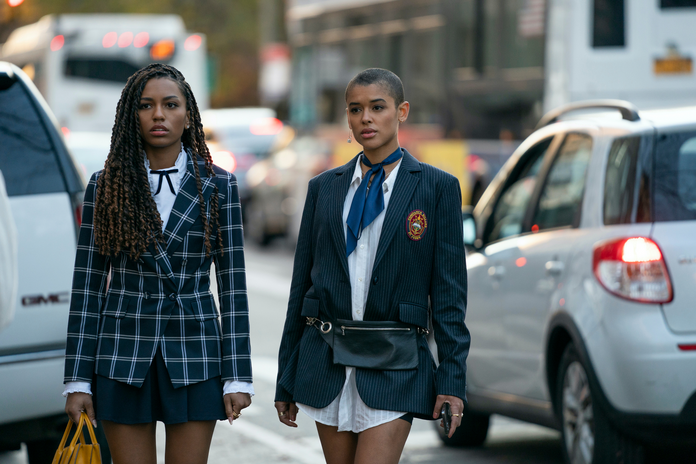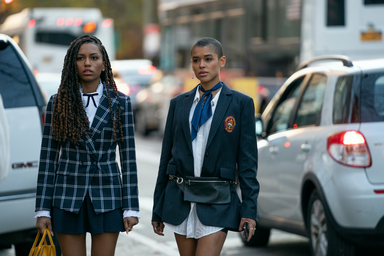After HBO announced the Gossip Girl reboot, feeling skeptical about it was an understatement. Rebooting a cultural icon that is firmly attached to the millennial zeitgeist is a lot of pressure and not necessarily something we should do. Let’s not pretend that Gossip Girl was good for society. Besides the constant girl-on-girl cattiness and redemption of Chuck, a serial sexual assaulter, it was a show about white privilege, before we knew what that meant. While it likely was a satire on the uber rich, the characters were never punished for their actions and never learned or corrected them. They were shamefully rich and privileged, and I’m not sure if young adults picked up on the satire. Instead, they emulated these toxic characters and tried to be like them. I remember doing this.
In a New York Times article, the lead creator of the show said, “The original show kind of completely avoided being aware of discrimination. It was very much just rich people and rich-people problems.”
This time, they wanted to show characters who were aware of their privilege––and here lies the issue. It’s not Gossip Girl anymore; it fails to be a good show in general for fear of repeating the old Gossip Girl.
The writing room is a serious issue
They wanted to tell more diverse stories, and in the same New York Times interview, they said they had a diverse writer’s room. Looking at the writers for each episode, I’m not seeing where the diversity comes from––and you can’t tell diverse stories without diverse representation. A quick Wikipedia search shows that Josh Safran wrote the first episode and the next two were penned by Lila Feinberg and April Blair. All of them are white. But the reboot stars two Black women at the centre of the narrative.
As a writer myself, I am very cognizant of the stories I’m sharing and whether or not I should be the person telling them, because I don’t want to tell a watered-down story. I don’t feel like three white people are the best candidates for writing about how wealth intersects with two Black women. It’s nuanced and complex and contributes to a big problem in Hollywood. White people can often assume that diversity is telling diverse stories. However, true diversity is making spaces for BIPOC people to write their own stories.
I think this could be why the show feels watered-down. Some serious topics are brought up but not really engaged with meaningfully, creating this sense of faux progressiveness. I do applaud the queer representation, though. Josh Safran says in the New York Times article that he is gay and wanted to share some of his experiences. However, it’s not transcending the old version because it’s still not addressing a major barrier to diversity.
We already know who Gossip Girl is
There’s no mystery driving the show. Gossip Girl was interesting because of the novelty with social medial; this “big brother is always watching” lined up with what was happening culturally. When Gossip Girl was telling the story, the anonymity of it represented a shift in technology. The teachers trying to get revenge on their students just seems silly, immature and borderline illegal.
The original version included their parents, but this worked because the kids were reliving their parent’s mistakes. Including the teachers is diluting the story, in my opinion, because I don’t care about their plotlines and find them irrelevant to the teenagers’ stories, resulting in this disjointed patchwork episode where nothing feels related.
It’s trying too hard to be woke
This is a major issue with young adult content. Older writers on the job view Gen Z through their own lens and it creates out-of-touch content that is almost mocking their culture rather than engaging with it. In Episode 1, someone says, “Are you straight shaming me?” No one says things like this other than old people making jokes about wokeness. It lacks authenticity and respect for the teenage experience, which won’t bring in younger viewers. When I think about old shows like The O.C. and One Tree Hill, they are so shamelessly dramatic and ridiculous. As a teenager, I remember relating to their predicaments, the chaos and the turmoil. The self-awareness of the new Gossip Girl characters are not genuine and is actually keeping them from making mistakes that could make the plot more interesting.
It’s also showing rich kids grappling with their privilege which is anything but “woke” in 2021. It’s not interesting as a plotline. I don’t think anyone cares, and it’s hard to stomach compared to other teen shows such as Euphoria and Good Trouble where the characters are actually either taking actions to make the world better or suffering from the consequences that wealth disparity, drugs and social media have on our generation.
The characters are blah
The original Gossip Girl made these horrible characters sympathetic. Though Blair Waldorf was the worst person, we understood why. Blair was a perfectionist who tried to make everything perfect and still never measured up in anyone’s eyes, especially in comparison to Serena who always seemed to effortlessly hold the spotlight. You felt for Dan – the outsider who fell in love with someone he thought was unattainable. We saw how Jenny didn’t fit in and just wanted to be liked by the popular girls. Though we couldn’t relate to their wealth, we could relate to some of their core identities and plotlines. By striving for likeable characters, we get a watered-down show that’s a little boring. Skilled writers don’t make likeable characters; they make hateful characters we somehow like, who drive the plot forward with their reactions to problems.
With the new version, there really isn’t much of a plot. The two sisters meeting is an interesting start and steers clear of typical tropes that involve conflict around a man. However, the original gave everyone a plotline and interwove them together seamlessly. The reboot highlights some characters to start with and then practically discards them in the later episodes. It’s also playing it safe. They don’t want to offend anyone and fall into some of the harmful tropes the old version had, such as the slut shaming and female drama. However, the original turned them all into protagonists for each other’s stories, which created a lot of conflict. If you don’t have the cattiness and brattiness, then it’s not really Gossip Girl. Rather than a plot, they’re relying on a concept. The “rebranding” of Gossip Girl just doesn’t work even if it’s morally better.
The luxury and lavish lifestyle is toned down
Gossip Girl aired around the housing crisis in 2007. Gossip Girl seemed like another world. A fantasy. It was lavish and luxurious and that’s what differentiated it from other teen shows at the time. The parties, fashion shows and galas all created this unattainable world that was escapism for many. New York City was basically its own character, as was the Upper East Side versus Brooklyn. Without this, it’s just not Gossip Girl.
I’m not saying it’s a bad thing that the luxury and lavish are toned down. I find the original Gossip Girl toxic, and Gen Z is much more interested in activism and critiquing their media sources. However, when you make a concept the entire show, it feels fake and boring. The characters aren’t reacting and moving the plot forward. They’re static and without arcs. Many of the characters are too perfect and likeable, and topics aren’t handled with nuance and complexity, instead skimmed over. Some shows are better left in the past.


